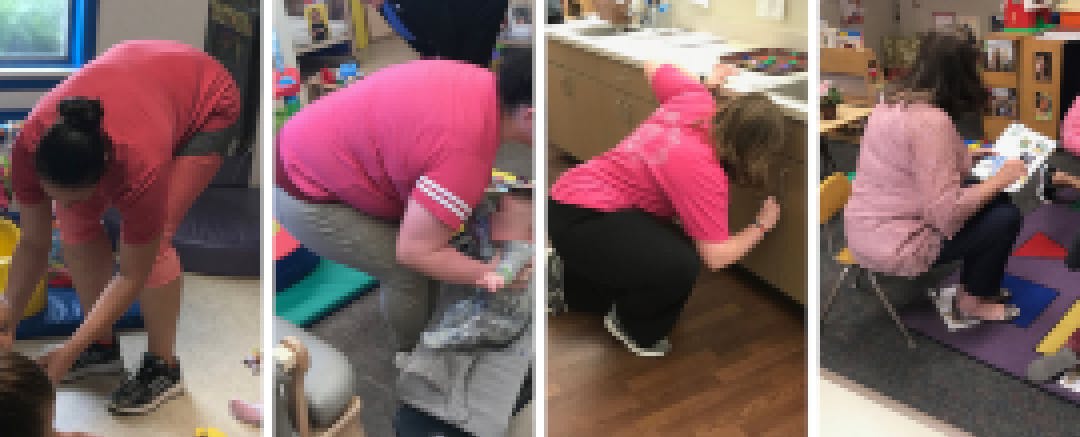“I’ve had my knees replaced. It’s some genetic, but also the work I do. I’m up and down, up and down, up and down all the time. I recently had a rib out of place so I went to therapy and was out of work for six weeks because I couldn’t lift. I think these issues are kind of normal for teachers, I guess.” That’s Ms. Sexton, an early childhood educator who has been working with infants and toddlers for thirty years.
Unfortunately, her experience isn’t uncommon.

Teachers play a critical role in young children’s development, especially for children who are at developmental risk due to factors including poverty and adverse child experiences. Yet the early childhood workforce is faced with the constant challenge of recruiting and retaining highly qualified teachers, in part due to low compensation, poor benefits and underappreciation.
Although it may seem obvious that a high-quality early childhood workforce is composed of well-trained, healthy, happy and committed teachers, there has been surprisingly little research focused on teacher well-being—especially the physical aspects—and what kinds of workplace support can improve it.
Our “Happy Teacher Project,” funded by the Early Childhood Education Institute and the University of Oklahoma, was launched to fill this void.
Oklahoma is a well-known pioneer in the field of early childhood education. The state was one of the first to implement a Quality Rating and Improvement System and universal pre-K, and Tulsa has earned a national reputation for providing numerous innovative and high-quality early childhood education centers and teacher education programs, which is why it is such a strong setting for our research.
It Takes a Village to Study and Support Whole Teacher Well-Being
The Happy Teacher Project takes a holistic and comprehensive approach by studying physical, psychological and professional well-being and how workplace conditions support these three areas.

When I began shaping our research questions, I immediately recognized that my greatest challenge would be that studying all four areas required a diverse team of researchers from a range of fields. So I built a strong interdisciplinary team of researchers and experts in early childhood education, physical therapy, interior design, educational policy, public health and nutrition, who shared the vision and passion to improve the lives of early childhood teachers.
Our research team collaboratively designed the study, collected data and developed recommendations for improvement. We believe this strong interdisciplinary collaboration makes it possible to facilitate discussion among experts across fields and to develop comprehensive and systematic ways to support whole teacher well-being.
What We Learned About Early Childhood Teacher Well-Being
Since December 2018, we have followed a group of 262 early childhood teachers across 38 early childhood centers in Tulsa, measuring these different aspects of whole teacher well-being. We divided our research into two phases and gathered data through surveys, interviews, observations and direct health assessment.
During the first phase, we surveyed educators about their well-being, designing questions to better understand their physical and mental health, job-induced stress, work-related injuries and job commitment. We also measured teachers’ weight for obesity and administered a step test for cardiorespiratory fitness. Then, we investigated what types of workplace supports were in place to improve teachers’ well-being, such as compensation, benefits, designated breaks, paid sick leave, work climate and the quality of their physical environment.
During the second phase, we observed different aspects of the learning environment in 40 classrooms including teacher-child interactions and environmental factors, such as noise level, air quality, lighting and furniture. Then we interviewed 40 teachers about what they need to improve their well-being.
What we found shocked us, but ironically, when we shared the results with teachers and administrators, nobody was surprised.
The good news is that the majority of teachers we surveyed viewed their job as a profession and felt committed to their work with children. The majority plan to stay in the current position.
The bad news is that many early childhood teachers in Tulsa are facing serious issues with their physical and psychological well-being, which is consistent with recent studies of early childhood teachers in other states such as North Carolina, Pennsylvania, Washington, and Texas.

The teachers in our study face significantly more physical health challenges than the general population. For example, three quarters were overweight or obese. Most had below average cardiorespiratory fitness. And a third reported doctor-diagnosed urinary tract infections. Additionally, about one third of the teachers in our study frequently felt stressed while on the job; 23 percent felt depressed.
Two-thirds of the teachers in our study also had ergonomic pain in at least one area of the body. This is likely because teachers of young children constantly bend, reach, twist and squat in environments that are typically child size, earning them the nickname “educational athletes” by a physical therapy researcher on our team.

Furthermore, we collected and analyzed data on teachers’ body postures during routine activities and analyzed them using the Rapid Entire Body Assessment, a tool that evaluates the whole body for risk of musculoskeletal injuries. According to the results, most of the routine tasks teachers do daily carry moderate-to-high risk for physical injury. The following three actions fall into the high risk category.
- standing while holding and reaching
- sitting and reaching
- stooping while holding
The most alarming news was revealed when we looked at the results of our study through the lens of teacher qualifications. Our survey findings revealed that teachers with higher education levels earned more and had better benefits. When we looked at the classroom observation data collected in phase two with a sample of 40 teachers for assessing instructional and social emotional care quality, we found that teachers with higher educational levels provided higher quality care.
At the same time, these teachers also reported poorer physical well-being with more ergonomic pains and job-induced injuries than teachers with lower qualifications. They also reported that they consider leaving their jobs more often than teachers with lower educational levels. This is concerning because teachers providing high quality care are the very people we want to target in recruitment and retention efforts to build a high-quality workforce.
Do Work Conditions Provide Support or Create Barriers for Early Childhood Educators?
Three quarters of the teachers in our study perceived that their work environment is somewhat or very supportive, and the majority of administrators we interviewed reported that they prioritize teacher well-being. Several teachers we interviewed mentioned how much they feel valued and shared that they appreciate the support they have received from colleagues and administrators.
But the reality of teachers’ workplace conditions suggested that there is still a lot of work to be done to fully support early childhood educators. Nearly half of the teachers we surveyed had no designated break, close to one-in-four had no paid sick days and a third lacked employer-provided health insurance.
One-third of teachers reported that they do not have space for relaxation or to store personal belongings and about one-fifth said they do not have adult size furniture. Our observations also revealed high noise levels in the classroom at a level similar to a busy street or alarm clock, which may have a negative impact on stress levels.
The Importance of Creating Happy and Healthy Workspaces for Both Children and Teachers
The results of our study suggest that there is considerable room for improving early childhood teachers’ working conditions and well-being. Our findings also corroborate previous studies on the importance of having highly qualified early childhood teachers. But most importantly, what has emerged from our study is the notion that in the quest to create and retain a happy, healthy early childhood workforce, compensation and benefits—while helpful—are not enough.
Based on our analysis of surveys, observations, health assessment data and teacher interviews, we have come up with a few suggestions to improve teachers’ work conditions and in turn, their well-being. Some are small tweaks and others are larger changes that may require multiple steps and mindset shifts to achieve. But together they offer a blueprint for supporting teachers.
- Carve out designated breaks for bathroom needs and mental stress relief
- Create a clean, quiet and clutter-free space for teachers with comfortable seating, a coffee maker, healthy snacks and a water dispenser
- Provide dedicated space, such as a small closet, to safely store personal belongings
- Design the physical environment in a way which allows both children and teachers to sit and work comfortably—that includes having child and adult size furniture
- Offer training to improve lifting techniques
- Implement fitness programs, such as yoga, to address flexibility, strength, endurance and mindfulness
- Provide intervention and mental health services
Caring About Teacher Well-Being Is a Moral Issue
Researchers often equate the importance of teacher well-being to the fact that it is a significant contributor to classroom quality and child outcomes. This is, of course, an important reason to care. But teacher well-being is not only important because it is linked to better care and learning outcomes, but also because it is a way we can show—not just tell—our teachers that they matter and that we care about them as human beings. It shouldn’t take a group of researchers to conclude that healthy and happy teachers lead to healthy and happy children.


